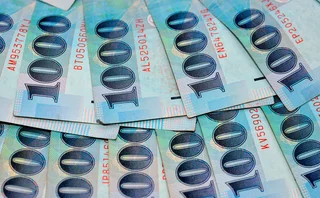
Limits to growth for Russian forex derivatives exchanges
The decline in the rouble led to a boom for Russian derivatives exchanges earlier this year, but local conditions mean growth is unlikely to continue.
According to the Bank of Russia, volumes of exchange-traded dollar contracts peaked on January 15 at $13.36 billion, up from $6.75 billion on September 15.
Daily trading records for dollar futures traded on Forts, the derivatives business of RTS, were broken on four occasions in January, peaking at 15,923 trades on January 20, while Micex reported that December volumes for dollar futures were 59.8% higher than the level reported in November. Meanwhile, in the OTC market, the notional value of trades declined steadily since November, falling from $17.13 billion to $8 billion between November 5 and April 7.
Karen Kostanian, co-head of Russian research at Bank of America-Merrill Lynch in Moscow, said a cautious attitude from liquidity suppliers, especially western banks, can account for the move towards exchanges. "Micex was the main market for foreign exchange trades during the worst of the crisis and remains as such. With international firms cutting lines on locals due to increased credit risk, turnover in the OTC spot market is much smaller than it used to be," he said.
But since January, the notional value of forex contracts traded on exchanges has declined again. By April 3, the value of exchange-traded dollar contracts had fallen back to $3.70 billion.
A Moscow-based head of derivatives at a large state-owned bank explained that for Russian financials the derivatives exchanges do not present the most attractive option. While a few of the larger banks may have access to the Chicago Mercantile Exchange, most Russian firms are only able to trade on the local exchanges, which they perceive as risky, he said.
For corporates, exchanges may also be considered less attractive, an emerging markets strategist at a UK bank said. "Trading on exchanges could be less attractive because it exposes you to the glare of the regulators, who will try to exercise moral suasion on you," he said.
"The regulators would be watching you all the time. You could get a call out of the blue saying 'be careful how big your holding of foreign currency assets becomes, because in buying them you are contributing to rouble weakness, and if you buy too many, don't think I'm going to help you out in the future if you need rouble liquidity'," he said.
Only users who have a paid subscription or are part of a corporate subscription are able to print or copy content.
To access these options, along with all other subscription benefits, please contact info@risk.net or view our subscription options here: http://subscriptions.risk.net/subscribe
You are currently unable to print this content. Please contact info@risk.net to find out more.
You are currently unable to copy this content. Please contact info@risk.net to find out more.
Copyright Infopro Digital Limited. All rights reserved.
As outlined in our terms and conditions, https://www.infopro-digital.com/terms-and-conditions/subscriptions/ (point 2.4), printing is limited to a single copy.
If you would like to purchase additional rights please email info@risk.net
Copyright Infopro Digital Limited. All rights reserved.
You may share this content using our article tools. As outlined in our terms and conditions, https://www.infopro-digital.com/terms-and-conditions/subscriptions/ (clause 2.4), an Authorised User may only make one copy of the materials for their own personal use. You must also comply with the restrictions in clause 2.5.
If you would like to purchase additional rights please email info@risk.net
More on Foreign exchange
Will Taiwan lifers ramp up FX hedging amid tariff turmoil?
As TWD remains strong against the US dollar, Taiwanese life insurers are still poised to act
Deutsche Bank takes AutobahnFX on the open road
Proprietary trading platform sets out new workflow-based approach to collaborating with venues
Dealers bullish on Bloomberg chat interface for FX markets
Service expanded its API offering to integrate broker chats into banks’ engines for cash FX pricing late last year
LCH expects to boost deliverable FX clearing with new adds
Onboarding of dealers and link-up with CLS could swell interbank deliverable FX clearing volumes
Does no-hedge strategy stack up for mag seven mavericks?
At Amazon, Meta and Tesla, the lack of FX hedging might raise eyebrows, but isn’t necessarily a losing technique
Amazon, Meta and Tesla reject FX hedging
Risk.net study shows tech giants don’t hedge day-to-day exposures
Intraday FX swaps could signal new dawn for liquidity management
Seedling market could help banks pre-fund payments in near-real time and reduce HQLA requirements
Natixis turns on the taps in flow trading
French bank boosts flow business, balancing structured solutions capabilities







